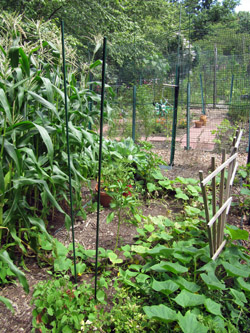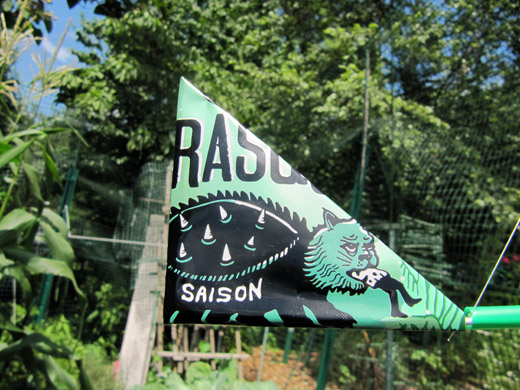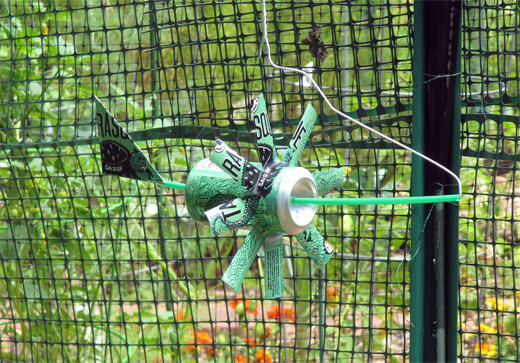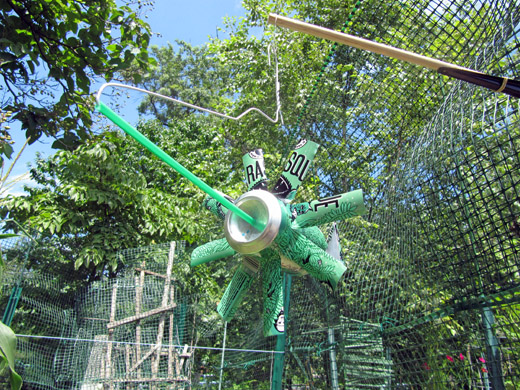 No matter the ground that’s granted to you,
No matter the ground that’s granted to you,
Whether sand-rotten or silt-riddled,
Whether shoots ripen in rich, sopping earth
To give their full and fattened yield,
Whether high hillsides or handily worked
Lowlands beckon, a level plain,
Or a valley roughened with veering slopes,
It cannot refuse to bring forth for you
Its native plants, provided that you
Don’t louse your labors with laziness…
—Walahfrid Strabo (d.849), De Cultura Hortorum (my translation)
Someday I may do what the ninth-century abbot of Reichenau wouldn’t have recommended: cultivate a garden full of medieval European plants. Until then, I’ll revel in my 169 square feet of New World fecundity, a bee-friendly spider-riot of corn, peppers, cucumbers, collards, squash, and beans. I try to be the largest creature on my tenancy; narrow paths and high, uneven fences keep the deer far hence, and I banish chipmunks and mice with a clemency that would put St. Francis to shame.
Even so, my garden cried out for a medieval beastie—and a certain clever loved one of mine decided to oblige.

That’s the tarasque, a marvelous and horrifying creature from the folklore of medieval Provence. With the head of a lion, the tail of a scorpion, six bear’s legs, and a turtle shell, the tarasque ravaged the countryside, until St. Martha—the biblical Martha—lulled it with prayers and hymns and lured it into town. Terrified locals killed it, after which they regretted attacking a tame monster, converted to Christianity, and renamed their town in the monster’s honor.
That’s the story in the 13th-century Legenda Aurea, anyway, and it sure did last: I had a vague memory of encountering this critter in another context long ago, so I went back to the Dungeons and Dragons Monster Manual II from 1983 (don’t judge me) and found this fearsome fellow:
 My tarasque is likewise domesticated—or at least domestic. Back in February, when the aforementioned loved one and I were in Memphis, an ice storm shut down the city. We were lucky to be stuck indoors with an assortment of local beer, including the Tarasque Saison from Wiseacre Brewing Company. I liked the can design, she’s got an inventive mind, and three months later, when we saw a garden store shamefully asking 20 bucks for whirligigs made out of nothing more than two beer cans, a wire hanger, and plastic straws, I heard a claim I’ve come not to doubt: “I could totally make that.”
My tarasque is likewise domesticated—or at least domestic. Back in February, when the aforementioned loved one and I were in Memphis, an ice storm shut down the city. We were lucky to be stuck indoors with an assortment of local beer, including the Tarasque Saison from Wiseacre Brewing Company. I liked the can design, she’s got an inventive mind, and three months later, when we saw a garden store shamefully asking 20 bucks for whirligigs made out of nothing more than two beer cans, a wire hanger, and plastic straws, I heard a claim I’ve come not to doubt: “I could totally make that.”
And so a couple weeks ago, having mostly forgotten the matter, I opened a box to find a terrific surprise: a trace of modern medievalism, a souvenir from a recent adventure, and a thoughtful, handmade present all rigged up into one.

After we calibrate the spinning blades a little, the wind vane at the tail should inspire optimal whirling. My garden is now a bit more medieval, if not more dignified. So be it. Such is a blog post befitting July, when the weather is languid, the wind is lazy, and writerly ambition is as tame as a tarasque.


//so I went back to the Dungeons and Dragons Monster Manual II from 1983 (don’t judge me)//
Represent!
LikeLike
That sounds like a much more pleasant encounter with the tarasque than most! I wonder if their graphic artist had been looking at the Visconti arms http://www.storiadimilano.it/Personaggi/Visconti/bernabo.htm The Visconti serpent devours his victim feet-first in the manner of a tyrant of Babylon.
LikeLike
Every last thing about this post is spiff-o-matic. With a guard like that, the fruits (and veggies) of your labor must be well taken care of.
LikeLike